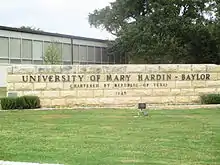Belton, Texas
Belton is a city in the U.S. state of Texas. Belton is the county seat of Bell County and is the fifth largest city in the Killeen-Temple metropolitan area. In 2020, the population of Belton was 23,054,[4] and the metro region had a population of 450,051[5] according to US Census estimates.
Belton, Texas | |
|---|---|
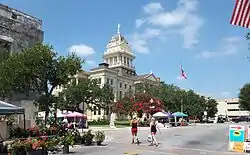 Downtown Belton near Bell County Courthouse | |
 Flag 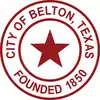 Seal | |
| Nickname: Beltown | |
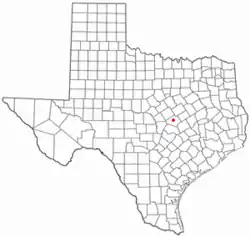 Location in the U.S. state of Texas | |
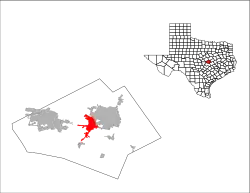 | |
 Belton, Texas Location in Texas, United States & North America  Belton, Texas Belton, Texas (the United States) 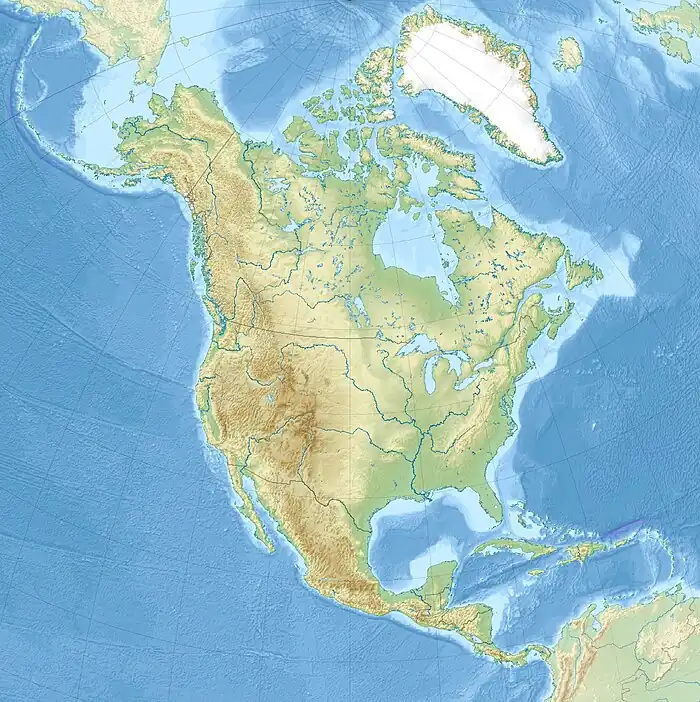 Belton, Texas Belton, Texas (North America) | |
| Coordinates: 31°3′32″N 97°27′48″W | |
| Country | United States |
| State | Texas |
| County | Bell |
| Established | 1850 |
| Named for | Peter H. Bell |
| Area | |
| • Total | 21.14 sq mi (54.74 km2) |
| • Land | 20.23 sq mi (52.39 km2) |
| • Water | 0.91 sq mi (2.35 km2) |
| Elevation | 509 ft (155 m) |
| Population (2020) | |
| • Total | 23,054 |
| • Density | 1,131.30/sq mi (436.79/km2) |
| • Demonym | Beltonian |
| Time zone | UTC-6 (Central (CST)) |
| • Summer (DST) | UTC-5 (CDT) |
| ZIP code | 76513 |
| Area code | 254 |
| FIPS code | 48-07492[2] |
| GNIS feature ID | 1351858[3] |
| Website | www |
History
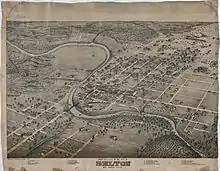
Belton and Bell County have been the site of human habitation since at least 6000 BCE. Evidence of early inhabitants, including campsites, kitchen middens and burial mounds from the late prehistoric era have been discovered in the Stillhouse Hollow Lake and Belton Lake areas. The earliest identifiable inhabitants were the Tonkawa, who traditionally followed buffalo by foot. Belton was also home to the Lipan Apache, Wacos, Nadaco, Kiowas and Comanche. By the 1840s most tribes had been pushed out by settlements, but skirmishes with the Comanche existed until the early 1870s.[6]
Belton was first settled 1850 and named Nolanville, taking the name of nearby Nolan Springs which were named for Texan explorer Philip Nolan. In 1851, it changed its name to Belton after being named the county seat of newly created Bell County named after Peter Hansborough Bell, the Governor of Texas at that time. In 1860, the population was 300, the largest in the county. During the run up to the civil war, Belton had a large pro-Union minority. A Whig Party paper and anti-secession paper called "The Independent" was published there and the city voted overwhelmingly for Sam Houston for governor, who was strongly against Texas secession.[7] Nonetheless, in 1861 Bell County voted for secession and many residents fought in the Confederate Army. After the civil war, Belton experienced unrest. Several pro-union sympathizers were lynched in 1866 and Federal troops were called in to protect the Federal Judge serving in the city. After Reconstruction, the city, close to a major feeder of the Chisholm Trail, served as growing business center for the region.
In 1868, Martha McWhirter, a prominent figure in Belton's non-sectarian Union Sunday School, created the Woman's Commonwealth, the only Texas women's commune of the 1800s. The commune started several business ventures including a successful hotel. In 1899, the group sold their holdings and relocated to Maryland.[8] The town experienced rapid growth in the 1880s with the building of the courthouse, Baylor Female College buildings, and a "railroad war" in which, by 1881, Belton was bypassed by the Gulf, Colorado and Santa Fe Railroad, which built Temple, 8 miles to the east, as the local junction and depot town. In 1904, the town reported a population of 3,700. The town began to thrive and reached a population of 6,500 in 1928. However the town was decimated by the Great Depression and was down to a population of 3,779 only three years later in 1931.[9]
The town began to recover in the run up to World War II as Fort Hood was opened nearby in 1942, housing the tank destroyer Tactical and Firing Center. Encompassing over 200,000 acres and almost 90,000 troops, this brought a large population and a lot of economic activity to the area. By 1950, the city's population was back up to 6,246 and by 1990 had reached 12,476. [10]
Geography
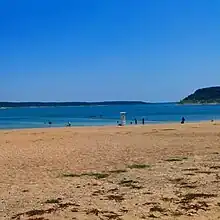
Belton is located 60 miles (97 km) north of Austin,[11] 137 miles (220 km) south of Dallas,[12] and 184 miles (296 km) west of Houston.[13] It is near the center of Bell County at 31°3′32″N 97°27′48″W (31.058904, –97.463382).[14] It is at the point where the Blackland Prairie, characterized by level ground and deep fertile soil, and the Edwards Plateau, characterized by its many springs, hills, and steep canyons, meet.[15] Its elevation is approximately 509 feet (155 m).[16]
It is bordered to the northeast by the Leon River, across which is the city of Temple. Nolan Creek, a tributary of the Leon, runs through the center of Belton. It is also southeast of Belton Lake and northeast of Stillhouse Hollow Lake with both touching its city limits. The city limits extend south along Interstate 35 across the Lampasas River nearly to Salado. And abuts Temple City limits at the Leon River
According to the United States Census Bureau, the city has a total area of 20.0 square miles (51.7 km2), of which 18.9 square miles (49.0 km2) is land and 1.0 square mile (2.6 km2), or 5.08%, is water.[17]
Climate
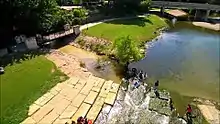
Belton has a humid subtropical climate under the Köppen climate classification. This climate is typified by hot and muggy summers, short mild winters, and pleasantly warm spring and fall seasons. Belton averages 35.2 inches (890 mm) of annual rainfall and it is distributed mostly evenly throughout the year.
The average temperature for the year in Belton is 66.3 °F (19.1 °C). The warmest month, on average, is August with an average temperature of 83.3 °F (28.5 °C). The coolest month on average is January, with an average temperature of 47.4 °F (8.6 °C).
Snow is rare in Belton, and ground accumulation even rarer. There's an average of 0.1" of snow (0 cm). The month with the most snow is January, with 0.1" of snow (0.3 cm). However, February 2021 brought a snowstorm to Belton that impacted many homes, forcing many people to live without power or heat for as long as a week. The snow was thick and the ice was thicker, blocking roads and making it very dangerous to drive.
Although severe weather can & does occur, typically during the spring with supercell thunderstorms it does not fall within the conventional limits of tornado alley.[18]
Demographics

| Census | Pop. | Note | %± |
|---|---|---|---|
| 1870 | 281 | — | |
| 1880 | 1,797 | 539.5% | |
| 1890 | 3,000 | 66.9% | |
| 1900 | 3,700 | 23.3% | |
| 1910 | 4,164 | 12.5% | |
| 1920 | 5,098 | 22.4% | |
| 1930 | 3,779 | −25.9% | |
| 1940 | 3,572 | −5.5% | |
| 1950 | 6,246 | 74.9% | |
| 1960 | 8,163 | 30.7% | |
| 1970 | 8,696 | 6.5% | |
| 1980 | 10,660 | 22.6% | |
| 1990 | 12,476 | 17.0% | |
| 2000 | 14,623 | 17.2% | |
| 2010 | 18,216 | 24.6% | |
| 2020 | 23,054 | 26.6% | |
| U.S. Decennial Census[19] | |||
| Race | Number | Percentage |
|---|---|---|
| White (NH) | 12,518 | 54.3% |
| Black or African American (NH) | 1,924 | 8.35% |
| Native American or Alaska Native (NH) | 75 | 0.33% |
| Asian (NH) | 378 | 1.64% |
| Pacific Islander (NH) | 28 | 0.12% |
| Some Other Race (NH) | 82 | 0.36% |
| Mixed/Multi-Racial (NH) | 970 | 4.21% |
| Hispanic or Latino | 7,079 | 30.71% |
| Total | 23,054 |
As of the 2020 United States census, there were 23,054 people, 7,453 households, and 4,157 families residing in the city.
As of the census[2] of 2000, there were 14,623 people, 4,742 households, and 3,319 families residing in the city. The population density was 1,171.3 inhabitants per square mile (452.2/km2). There were 5,089 housing units at an average density of 407.6 per square mile (157.4/km2). The racial makeup of the city was 72.67% White, 8.10% African American, 0.64% Native American, 0.95% Asian, 0.10% Pacific Islander, 14.83% from other races, and 2.71% from two or more races. Hispanic or Latino of any race were 25.13% of the population.
There were 4,742 households, out of which 37.3% had children under the age of 18 living with them, 49.9% were married couples living together, 16.1% had a female householder with no husband present, and 30.0% were non-families. 24.6% of all households were made up of individuals, and 10.6% had someone living alone who was 65 years of age or older. The average household size was 2.69 and the average family size was 3.23.
In the city, the population was spread out, with 26.9% under the age of 18, 18.4% from 18 to 24, 26.5% from 25 to 44, 17.1% from 45 to 64, and 11.1% who were 65 years of age or older. The median age was 28 years. For every 100 females, there were 95.0 males. For every 100 females age 18 and over, there were 90.4 males.
The median income for a household in the city was $32,052, and the median income for a family was $38,635. Males had a median income of $31,304 versus $20,678 for females. The per capita income for the city was $14,345. About 12.7% of families and 17.9% of the population were below the poverty line, including 20.7% of those under age 18 and 14.0% of those age 65 or over.
Education
Belton is served by the Belton Independent School District. The school district operates three high schools, four middle schools and nine elementary schools (a handful of which happen to be outside of the city's borders). The district and all of its campuses received the Texas Education Agency's highest accountability rating (met standard) based on student performance on the State of Texas Assessment of Academic Readiness. Both Belton High School & Belton New Tech High School have been included on lists of the nation's best high schools compiled by U.S. News & World Report and Newsweek. Belton New Tech High School and South Belton Middle School have been recognized as Apple Distinguished Schools for their implementation of the district's digital learning initiative. Belton ISD also offers prekindergarten at Belton Early Childhood School.
Falling in Temple, TX city limits but within the boundaries of Belton Independent School District is Central Texas Christian School a private Christian K–12 school with an enrollment of approximately 570 students.[23]
Higher education
Belton is home to the University of Mary Hardin–Baylor. Founded in 1845, it is a private Christian university affiliated with the Baptist General Convention of Texas.[24][25] Awarding degrees at the baccalaureate, master's, and doctoral levels it has an enrollment of 3,898.[26]
Parks and recreation

The city maintains 13 city parks. Largest among them are Heritage Park, which is along the Leon River. Yettie Polk Park, which winds along Nolan Creek with a walking trail reaching from down and Interstate 35 to the University of Mary Hardin-Baylor, And Miller Springs Nature Center offering hiking trails along the Leon River below the Belton Lake Dam.
For recreation, Belton has two major lakes: Belton Lake on the Leon River, and Stillhouse Hollow Lake on the Lampasas River. Belton Lake has 11 public access parks owned and maintained by the United States Army Corps of Engineers. Stillhouse Lake has four with lake access. These parks offer many amenities such as boat docks, picnic areas, hike and bike trails, camping sites, public restroom facilities, marinas and designated sandy swimming beaches.[27]
There is also a water park, Summer Fun Water Park, which features slides, a lazy river, and other fun activities. Food may also be purchased both inside and in a building just outside of Summer Fun which serves assorted snacks.
Notable people
- David Ash, football player, graduated from Belton High School
- Danny Barnes, musician
- George Eads, actor, graduated from Belton High School
- Miriam Amanda Wallace "Ma" Ferguson, first female Governor of Texas
- Jerry Grote, MLB baseball player, lives in Belton
- Rick Hoberg, comic artist of All-Star Squadron, Green Arrow and The Strangers
- George Jo Hennard, mass murderer, and perpetrator of the Luby's shooting
- Chris Marion, musician, of the Little River Band was born in Belton
- Khiry Robinson, NFL football player
- Ricky Sanders, NFL football player, graduated from Belton High School
- Pat Seals, musician, from the alternative rock band Flyleaf
- Walton Walker, U.S. Army general officer killed in action in the Korean War
- Henry T. Waskow, the basis of a famous article by Ernie Pyle, was a Belton native
- William Wilbanks, American criminologist, Texas High School Basketball Hall of Fame member
- Rudy Youngblood, actor, graduated from Belton High School[28][29][30]
Sports
Baseball
- Red Murff Field (2005)
References
- "2019 U.S. Gazetteer Files". United States Census Bureau. Retrieved August 7, 2020.
- "U.S. Census website". United States Census Bureau. Retrieved January 31, 2008.
- "US Board on Geographic Names". United States Geological Survey. October 25, 2007. Retrieved January 31, 2008.
- "Population and Housing Unit Estimates". Retrieved May 21, 2020.
- "Table 1. Annual Estimates of the Population of Metropolitan and Micropolitan Statistical Areas: April 1, 2000 to July 1, 2009 (CBSA-EST2009-01)". 2009 Population Estimates. United States Census Bureau, Population Division. March 23, 2010. Archived from the original (CSV) on June 15, 2010. Retrieved March 25, 2010.
- "Handbook of Texas Online-Bell County". Retrieved June 27, 2017.
- The Belton Independent
- Texas State Historical Association - Belton Woman's Commonwealth
- "Handbook of Texas Online". Retrieved June 27, 2017.
- "Handbook of Texas Online". Retrieved June 27, 2017.
- "Distance from Belton, TX to Austin, TX". trippy.com. Retrieved January 11, 2019.
- "Distance from Belton, TX to Dallas, TX". trippy.com. Retrieved January 11, 2019.
- "Distance from Belton, TX to Houston, TX". trippy.com. Retrieved January 11, 2019.
- "US Gazetteer files: 2010, 2000, and 1990". United States Census Bureau. February 12, 2011. Retrieved April 23, 2011.
- "Texas Ecoregions". tpwd.texas.gov. Retrieved January 11, 2019.
- "Belton TX Lat Coordinates". latlong.net. Retrieved January 11, 2019.
- "Geographic Identifiers: 2010 Demographic Profile Data (G001): Belton city, Texas". U.S. Census Bureau, American Factfinder. Archived from the original on February 12, 2020. Retrieved April 10, 2014.
- "Belton Texas Weather Summary". weatherbase.com. Retrieved January 11, 2019.
- "Census of Population and Housing". Census.gov. Retrieved June 4, 2015.
- "Explore Census Data". data.census.gov. Retrieved May 24, 2022.
- http://www.census.gov
- "About the Hispanic Population and its Origin". www.census.gov. Retrieved May 18, 2022.
- "Central Texas Christian School". www.ctcslions.com. Archived from the original on May 29, 2009.
- The University of Mary Hardin-Baylor
- "Baptist General Convention of Texas - Supported Universities". Archived from the original on May 16, 2011. Retrieved January 26, 2008.
- [news.umhb.edu/archive/2015?page=1 University of Mary Hardin-Baylor News Article]
- Stillhouse Lake Parks
- Times-News, Oct. 17 1991
- Seattle Times, Oct 17 1991
- "Catholic Online, Nov. 6 2009". Archived from the original on June 6, 2011. Retrieved March 22, 2010.
External links
- City of Belton official website
- The Belton Journal, Texas's oldest continuously published weekly newspaper (since 1866)
- SeeBelton - General info on Belton, including calendar of upcoming events
